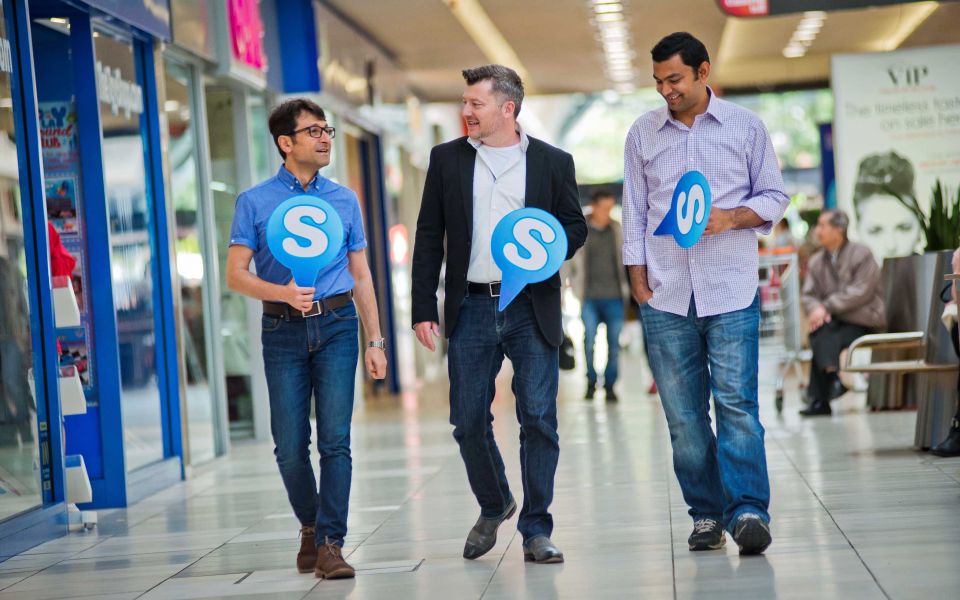
Tech firm secures £1.4m funding to develop indoor positioning software

A technology firm that has developed world-class indoor positioning software is creating new jobs in Edinburgh after securing £1.4m funding.
Sensewhere has developed technology that uses signals from indoor electromagnetic sources like Wi-Fi routers and Bluetooth to pinpoint a user’s location in areas like shopping centres and airports – where GPS signals from satellites are weak or blocked.
Rob Palfreyman, chief executive and co-founder, sensewhere:
“What we do is very niche, but we have a very cosmopolitan workforce with maybe nine or ten different nationalities. Again that’s driven by the attraction of Edinburgh, its world-class universities and the credentials of its tech companies.”
“GPS doesn’t work inside buildings, because the structure of the building blocks the signal,” explains Palfreyman. “We provide a GPS-like service when the user goes inside. Before, there was no accurate way of location targeting people inside venues.”
Global demand
Sensewhere’s software is now being used by companies in sectors such as social media, gaming, retail, advertising and mapping. Its customers include satnav specialist TomTom and Tencent, China’s biggest internet services company and a major investor in sensewhere.
“We’ve got more than 600m monthly active users,” Palfreyman says. “It’s a global service, so it can be used wherever a device is being used in the world. It’s important that users can navigate around complex indoor spaces.”
“It’s important for marketers to be able to share marketing information with people based on their location. It’s also important for emergency services to know where people are. Our technology also supports social web services, chat apps and gaming navigation.”
The grant funding from Scottish Enterprise will support research and development.
“Mobile solutions is quite a fast-moving space, so this will help us stay ahead of the curve,” Palfreyman adds. “It will enable us to increase our presence in Edinburgh, grow our headcount and go to other markets.”
Jobs growth
The new jobs are being created in engineering roles covering areas such as big data, cloud development, location technology and software development. Sensewhere already employs 24 staff worldwide, including 18 at its head office on Edinburgh’s Princes Street.
Its international offices are in Mountain View, California, China’s capital Beijing, and Shenzen in south-east China. The company’s original office here was in the City of Edinburgh Council’s joint incubator with the Shenzhen Municipal Government.
Sensewhere started life as a spin-out from the University of Edinburgh, and has benefited from the city’s academic credentials.
“Being in close proximity to academic institutions like the University of Edinburgh, Heriot-Watt University, Edinburgh Napier University and Queen Margaret University is a big attraction and has helped us attract good quality graduates,” Palfreyman says.
“The tech sector here has also continued to strengthen and is very vibrant, with lots of very good technology companies. What we do is very niche, but we have a very cosmopolitan workforce with maybe nine or ten different nationalities. Again, that’s driven by the attraction of Edinburgh, its world-class universities and the credentials of its tech companies.”
Market potential
Palfreyman himself spent nine years in semiconductor manufacturing in the US and another two years in location technology businesses before setting up sensewhere with chief technology officer Tughrul Arslan and vice president of engineering Zankar Sevak. The opportunity is to touch everyone who uses a mobile device with the company’s location software.
“The potential is to be the de facto indoor positioning solution,” Palfreyman says. “We’re not just selling in Edinburgh or Scotland or the UK. This is a truly global positioning solution that is highly scalable and low cost. The potential market is huge. Location-based advertising alone was worth $11.3 billion in 2016.”
His message to other investors is that Edinburgh has a great talent pool and is the place to get ideas off the ground.
“There’s a very good angel and venture capital community – and there’s very good support from agencies like Scottish Enterprise for companies looking to set up here,” he adds. “I think all that really does make a big difference. If we were trying to do what we do in England, we probably wouldn’t have done it – because there’s not that same level of support.”